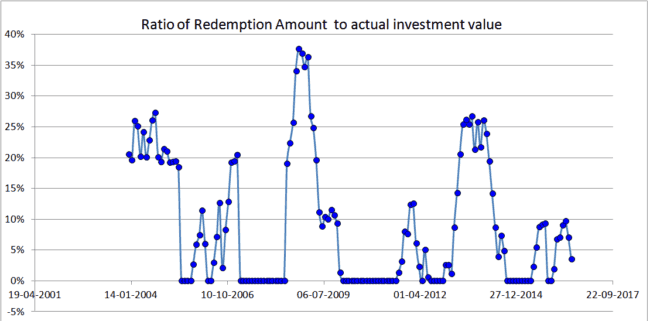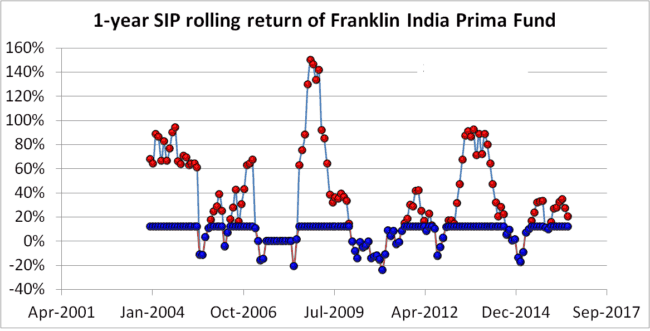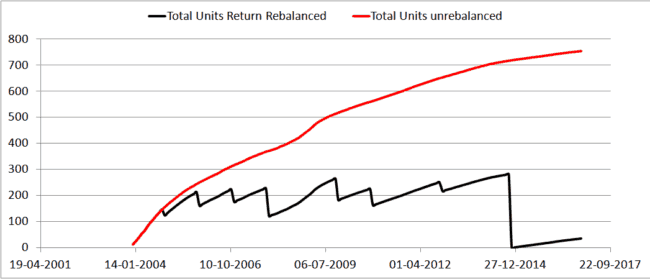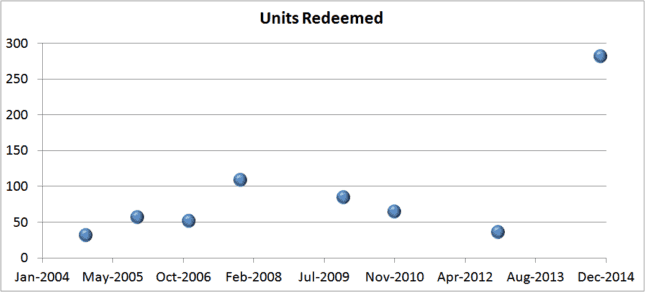Last Updated on December 25, 2021 at 10:58 pm
Suppose my current annualised return from an equity mutual fund is 25% and my expectation is only 12%, can I book the excess return (13%) as profit into a safe investment? What if I do this from time to time? Reader Prakash Bala wanted me to create a tool for this and in this post, I discuss if this approach makes sense in the first place.
The notion of an annualized return in equity or any market-linked security is an amusing one. Most people assume the XIRR (for multiple investments) or the CAGR (for a single investment) refers to the rate at which the investment grows year upon year. This is completely wrong. The XIRR is merely an estimate of growth. A high value is obviously good but it does not actually mean much. Read this for a simple explanation of What is XIRR
The second aspect is the nature of equity returns. It varies so much that we cannot imagine its impact year after year.
What is the motivation behind such “profit booking”? It is rebalancing.
Join 32,000+ readers and get free money management solutions delivered to your inbox! Subscribe to get posts via email! (Link takes you to our email sign-up form)
🔥Want to create a complete financial plan? Learn goal-based investing? Exclusive access to our DIY tools? Increase your income with your skills? Enjoy massive discounts on our robo-advisory tool & courses! 🔥
Rebalancing is done using portfolio weights. For example, if I start with a portfolio that 60% equity exposure and 40% fixed income and after one year, it becomes 70% equity and 30% fixed income. I can protect some gains by shifting 10% of equity to fixed income and resetting the portfolio.
Now instead of portfolio weights, Prakash (and many others like him) would like to rebalance using excess returns with a specific return expectation.
The first issue in this approach is the estimation of profits. Suppose my expectation is 12% and the fund return is 20%, the “excess profit” is not 8%!!
These 12% and 20% numbers are annualized returns and not absolute returns (which refers to gain or loss). So such a simple subtraction is not possible.
Suppose I invest Rs. 1000 a month for 12 months and on the date of the 12th instalment, my investment value is Rs. 13,068, the XIRR function would result in 20% as an estimate of the annualised return.
Now I need to use Excels Goal Seek function to change the investment value such the XIRR = 12%. This is Rs. 12,651. Therefore, I must book a profit of 13068-12651 = Rs. 417 to reduce gains to 12%. This is only notional. The actual XIRR will not reduce if such a redemption is made. Thus the redemption amount is 3.2% of the actual investment value.
This calculation is not a big deal. Suppose I do this exercise each year from Dec 2003 for Franklin Prima Fund.

Each blue dot represents the ratio of profit-booked to actual investment value for 1Y SIPs. Profits were booked only when XIRR was above 12%. The amount removed was such that the XIRR will reduce to 12%. So the zero blue dots above represent periods when XIRR was less than 12%.
The XIRR before and after such profit booking (after is purely imaginary) is shown below.
The blue dots represent profit booked values.
When you look at this, it sounds like a promising way to book excess gains. Not so fast. What you see above is for independent 1Y periods.
Now consider an ongoing SIP in Franklin Prima from Dec. 2003. Every year, you calculate XIRR. If it is above 12%, you calculate the amount that has to be removed to reduce XIRR to 12% and remove it.
Once the amount to be removed is determined, using current NAV, the units to be redeemed can be calculated. The total units for an unrebalanced SIP and a return-rebalanced SIP is shown below. There are 156 data points in each line.

The actual no of units redeemed is shown below.
 The highest redemption is 282 points which is almost 40% of all units held. Is such a large redemption justified when the actual XIRR is only 20% (just 8% above target return)?
The highest redemption is 282 points which is almost 40% of all units held. Is such a large redemption justified when the actual XIRR is only 20% (just 8% above target return)?
The purpose of rebalancing is to preserve gains, but overdo it then the net return would suffer. Apply rebalancing excess returns algorithmically seems to be an overkill.
After 156 SIP instalments, you don’t want to be left with only 35 units of the equity fund just because you want to “book profits” when your fund return is above target return.
Therefore, I would stick to the traditional rebalancing approach based on portfolio weights. One could argue that such return balancing can be done manually on a case by case basis and not periodically. Yes, that makes sense although I have no idea about the impact of this on a portfolio. If you wish to do this, you can consider learning the Excel Goal Seek Function.
🔥Enjoy massive discounts on our courses, robo-advisory tool and exclusive investor circle! 🔥& join our community of 7000+ users!
Use our Robo-advisory Tool for a start-to-finish financial plan! ⇐ More than 2,500 investors and advisors use this!
Track your mutual funds and stock investments with this Google Sheet!
We also publish monthly equity mutual funds, debt and hybrid mutual funds, index funds and ETF screeners and momentum, low-volatility stock screeners.





- Do you have a comment about the above article? Reach out to us on Twitter: @freefincal or @pattufreefincal
- Have a question? Subscribe to our newsletter using the form below.
- Hit 'reply' to any email from us! We do not offer personalized investment advice. We can write a detailed article without mentioning your name if you have a generic question.
Join 32,000+ readers and get free money management solutions delivered to your inbox! Subscribe to get posts via email! (Link takes you to our email sign-up form)
About The Author
 Dr M. Pattabiraman(PhD) is the founder, managing editor and primary author of freefincal. He is an associate professor at the Indian Institute of Technology, Madras. He has over ten years of experience publishing news analysis, research and financial product development. Connect with him via Twitter(X), Linkedin, or YouTube. Pattabiraman has co-authored three print books: (1) You can be rich too with goal-based investing (CNBC TV18) for DIY investors. (2) Gamechanger for young earners. (3) Chinchu Gets a Superpower! for kids. He has also written seven other free e-books on various money management topics. He is a patron and co-founder of “Fee-only India,” an organisation promoting unbiased, commission-free investment advice.
Dr M. Pattabiraman(PhD) is the founder, managing editor and primary author of freefincal. He is an associate professor at the Indian Institute of Technology, Madras. He has over ten years of experience publishing news analysis, research and financial product development. Connect with him via Twitter(X), Linkedin, or YouTube. Pattabiraman has co-authored three print books: (1) You can be rich too with goal-based investing (CNBC TV18) for DIY investors. (2) Gamechanger for young earners. (3) Chinchu Gets a Superpower! for kids. He has also written seven other free e-books on various money management topics. He is a patron and co-founder of “Fee-only India,” an organisation promoting unbiased, commission-free investment advice.Our flagship course! Learn to manage your portfolio like a pro to achieve your goals regardless of market conditions! ⇐ More than 3,000 investors and advisors are part of our exclusive community! Get clarity on how to plan for your goals and achieve the necessary corpus no matter the market condition is!! Watch the first lecture for free! One-time payment! No recurring fees! Life-long access to videos! Reduce fear, uncertainty and doubt while investing! Learn how to plan for your goals before and after retirement with confidence.
Our new course! Increase your income by getting people to pay for your skills! ⇐ More than 700 salaried employees, entrepreneurs and financial advisors are part of our exclusive community! Learn how to get people to pay for your skills! Whether you are a professional or small business owner who wants more clients via online visibility or a salaried person wanting a side income or passive income, we will show you how to achieve this by showcasing your skills and building a community that trusts and pays you! (watch 1st lecture for free). One-time payment! No recurring fees! Life-long access to videos!
Our new book for kids: “Chinchu Gets a Superpower!” is now available!


Must-read book even for adults! This is something that every parent should teach their kids right from their young age. The importance of money management and decision making based on their wants and needs. Very nicely written in simple terms. - Arun.Buy the book: Chinchu gets a superpower for your child!
How to profit from content writing: Our new ebook is for those interested in getting side income via content writing. It is available at a 50% discount for Rs. 500 only!
Do you want to check if the market is overvalued or undervalued? Use our market valuation tool (it will work with any index!), or get the Tactical Buy/Sell timing tool!
We publish monthly mutual fund screeners and momentum, low-volatility stock screeners.
About freefincal & its content policy. Freefincal is a News Media Organization dedicated to providing original analysis, reports, reviews and insights on mutual funds, stocks, investing, retirement and personal finance developments. We do so without conflict of interest and bias. Follow us on Google News. Freefincal serves more than three million readers a year (5 million page views) with articles based only on factual information and detailed analysis by its authors. All statements made will be verified with credible and knowledgeable sources before publication. Freefincal does not publish paid articles, promotions, PR, satire or opinions without data. All opinions will be inferences backed by verifiable, reproducible evidence/data. Contact information: To get in touch, use this contact form. (Sponsored posts or paid collaborations will not be entertained.)
Connect with us on social media
- Twitter @freefincal
- Subscribe to our YouTube Videos
- Posts feed via Feedburner.
Our publications
You Can Be Rich Too with Goal-Based Investing
 Published by CNBC TV18, this book is meant to help you ask the right questions and seek the correct answers, and since it comes with nine online calculators, you can also create custom solutions for your lifestyle! Get it now.
Published by CNBC TV18, this book is meant to help you ask the right questions and seek the correct answers, and since it comes with nine online calculators, you can also create custom solutions for your lifestyle! Get it now.Gamechanger: Forget Startups, Join Corporate & Still Live the Rich Life You Want
 This book is meant for young earners to get their basics right from day one! It will also help you travel to exotic places at a low cost! Get it or gift it to a young earner.
This book is meant for young earners to get their basics right from day one! It will also help you travel to exotic places at a low cost! Get it or gift it to a young earner.Your Ultimate Guide to Travel
 This is an in-depth dive into vacation planning, finding cheap flights, budget accommodation, what to do when travelling, and how travelling slowly is better financially and psychologically, with links to the web pages and hand-holding at every step. Get the pdf for Rs 300 (instant download)
This is an in-depth dive into vacation planning, finding cheap flights, budget accommodation, what to do when travelling, and how travelling slowly is better financially and psychologically, with links to the web pages and hand-holding at every step. Get the pdf for Rs 300 (instant download)